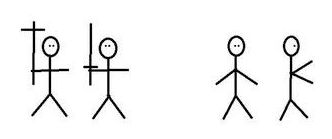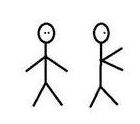Political Parties (Part Two): The Factions Within The Factions

Studies of authoritarian personalities have provided considerable insight into the conflicting political factions of “Conservatives” and “Liberals.” There also appear to be identifiable factions within these factions, with their own distinguishable value priorities. Thus, the major political political factions themselves experience internal conflict.
As I mentioned in another essay, the concept and measurement of the “authoritarian personality” began in 1950. Both the concept and measurement were later refined by Bob Altemeyer, beginning at least in 1981. His research repeatedly found that there were individuals with personalities that included (1) a high degree of submission to established authorities in their society, (2) high levels of aggression in the name of their authorities, and (3) high levels of conventionalism. Altemeyer called these individuals "Right-Wing Authoritarians," or "RWAs." In 1996, Altemeyer found that RWAs also got high positive scores on personality scales for "Religious Fundamentalism," "Self-Righteousness," "Traditionalism," "Dangerous World" belief, "Conformity," and "Need for Structure." The implication was that RWAs tended to be religious fundamentalists who saw the world as dangerous and themselves as "righteous." They were conformists who needed structure, and they valued the maintainance of traditional ideas and norms.
Pursuing a different concept, psychologists Felicia Pratto, Jim Sidanius, Lisa M. Stallworth, and Bertram F. Malle announced in 1994 that they had found another personality complex with political implications: the "Social Dominance Orientation:" They had theorized that there were individuals who, based on their personality, would "favor social practices that maintain or exacerbate inequality among groups and will oppose social practices that reduce group inequality." Between 1990 and 1992, they gave a battery of personality tests to almost 2,000 college students and found that, indeed, there was such a thing as a Social Dominance Orientation ["SDO"]. They also found that this SDO had significant positive associations with support for capitalism (which legitimizes economic inequality), nationalism, racism, cultural elitism, support for the military and support for wars of dominance (i.e., not for "humanitarian" wars).
Altemeyer read their work, and in his 1996 study of RWAs, he also subjected SDOs to popular personality tests. He found that SDOs had their strongest association with the value of Power, which Shalom Schwartz defined as the value of "Social status and prestige, control or dominance over people and resources." Altemeyer also found small but statistically significant relationships between RWAs and SDOs, indicating that the two political orientations could overlap in some areas: both RWAs and SDOs were substantially associated with ethnocentrism and prejudice against homosexuals, Blacks and women. However, Altemeyer found that RWAs were more strongly associated with religious fundamentalism, self-righteousness and traditionalism than SDOs. SDOs, on the other hand, were more strongly associated with value of power than RWAs.
This simultaneous overlap and distinction could explain why the “Conservative” faction, the one seeking to “conserve” the status quo, is commonly seen as having two distinguishable sub-factions: those concerned with maintaining the established, traditional culture (especially religious) and those concerned with maintaining the established power hierarchies (capitalist and supremacist). Some individuals will have a political orientation that combines the two, but many more will favor one or the other. The result is a somewhat conflicted alliance.

It’s my hypothesis that a similar phenomenon occurs within the “Liberal” faction, the “Anti-Authoritarians.”
In Bob Altemeyer's 1996 study, there were two values found to have significantly negative associations with RWA and SDO orientations: "Self-Direction," which Shalom Schwartz defines as "independent, autonomous thought and action;" and "Universalism," which Shalom Schwartz defines as "Understanding, appreciation, tolerance and protection for the welfare of all people and for nature." Moreover, the negative association with "Self-Direction" was stronger for RWAs than for SDOs, while the negative association with "Universalism" was stronger for SDOs than for RWAs.
It struck me that these results suggested who was at the opposite ends of the RWA and SDO scales. High RWAs strive to maintain traditional rules as the basis for authority. Their opposites would be people who were “self-directed,” willing to entertain new rules and decide for themselves which rules had legitimate authority. I call it a "Self-Guided Orientation," or "SGO" (to avoid having two “SDOs”). On the other hand, high SDOs strive to establish and maintain superiority for themselves and/or their identity groups as the basis for authority. Their opposites would be “universalists,” people oriented toward "understanding, appreciation, tolerance and protection for the welfare of all people and for nature." As discussed by Felicia Pratto et al., such individuals are more oriented toward social equality, altruism, tolerance, and empathy toward individuals who are not like them. I call this political orientation a "Holistic Welfare Orientation," or "HWO." If HWOs are oriented politically towards equality and protection for the welfare of all people, I think it's fair to surmise that HWOs peceive legitimate authority as deriving from consensus and common benefit.
Given Altemeyer’s discovery that RWAs and SDOs can overlap in some areas, it’s my hypothesis that SGOs and HWOs can overlap as well. However, just like RWAs and SDOs, these two political orientations retain distinguishable value priorities. They can and do form an “anti-authoritarian” alliance against the status quo, seeking changes from tradition and greater equality in power relationships. But, like the “authoritarian” alliance, the “anti-authoritarian” alliance will experience internal conflict, due to the differing value priorities of SGOs and HWOs. I think this is why organizing Liberals has been compared to herding cats: many of us (I include myself) are independent thinkers, we make up our own minds, we don’t automatically follow a designated leader. I think that’s why, in 2016, Bernie could ask his supporters to vote for Hillary, but those with high SGO didn’t automatically oblige. If you have a high SGO, you’ll want to make up your own mind, regardless of what someone else says. And you could come to a different conclusion.



Comments
Being spatially oriented
...I find the concept of the four interactive personality types so much easier to remember and understand when placed on a grid, similar to a Political Compass grid. [Which I am sure you are familiar with.] It's much easier to imagine their spectrums of intensity and range of interactions, with the added dimension of a field of action. Although I do like the clever stick figures.
.
.
I can see how the Self-Guided would hold back and perhaps make a different choice depending on the value they placed on a Democratic Party victory. Bernie supporters who chose not to support Hillary were likely supporting Bernie for his policies, alone. The fact that he was running as a Democrat was not a prime consideration.
I think there may also be some "Right-Wrong Authoritarian" types in the mix who did see the value of a Democratic Party victory. However, the corruption and wrong-headedness of Hillary Clinton was being forced on them when there were decent Democrats who could stand for President. Their sense of Right-Wrong authority broke their bond with the Democratic Party. It also damaged their bond with Bernie Sanders. I dare say there were more of these involved in the final outcome of the election than there were Self-Guided types, who likely directed themselves to vote for Hillary anyway.
Of course, there are many possible interpretations. Thanks again for posting this fascinating essay series here.
Clintonites
The Clintonites are Right-Wing Authoritarians to their core, IMHO. It was manifest by the fall of 2015. Bernie forced them out of their phony progressivism, as you say, by so passionately advocating for real progressive policies with an undeniable sincerity that traced back through his entire life. That advocacy alone force the Authoritarian Dem Leadership into showing their true colors. They reacted and continue to react as all authoritarians do, with appeal to FEAR as discussed in AB's first essay. In this context, RussiaGate was the only card they had to play and they played it extremely well, aided and abetted by Bernie himself. Yes, it has just imploded, but they could care less because it was never in my mind about proving collusion. It was always just a means of fear driven distraction to allow them to re-consolidate their power. (Exhibit 1, Tom Perez)
Opposites
Again, as in your last essay, I offer a great analysis from the great John Dewey from 1916:
In his definition, he states (bolded) that a democratic society repudiates external authority yet must find a its substitute in voluntary disposition and interest. It cannot be coerced by an authoritarian figure. It can only come about through democracy as a way of life and thought. One must be willing to give and take.
The opposite of this in Dewey's analysis is the authoritarian mind you discuss here and in your last essay as he describes so perfectly here:
One need only watch 10-15 minutes of television to understand that we have devolved so completely into an authoritarian culture as a way of life, the exact opposite frame of mind that Dewey instructed as most necessary for our collective well being.
If we want a democratic society in any form, we must act with a democratic spirit. I feel that spirit is alive and well here at C99 but tragically lost in all other areas of social contact in my life. We need to restore that democratic spirit to direct the radical change that we need. We cannot obtain that change, however radical, through any other means than that of our collective democratic spirit.
Thank you for this essay.
Good essay, good links, thanks n/t
I prefer distinctions along a scale
such as Myers -Briggs as they allow for grey areas that can be much more valuable analytically and predictively. (Myers-Briggs is a 30 scale. Ironically I am personally a 28 28 16 16 - an extreme intuitive introvert who couldn't care less about feeling/thinking and judging/perceiving)
On to Biden since 1973
I really don't see the point
in these deep analyses of personalities.
People vote for what they want. Simple. They may win or not. Simple.
Although the US has been hijacked by the wealthy interests, the purpose of democracy is to resolve differences peacefully. And the US structure has worked fairly well compared to other world government structures over its life span.
dfarrah